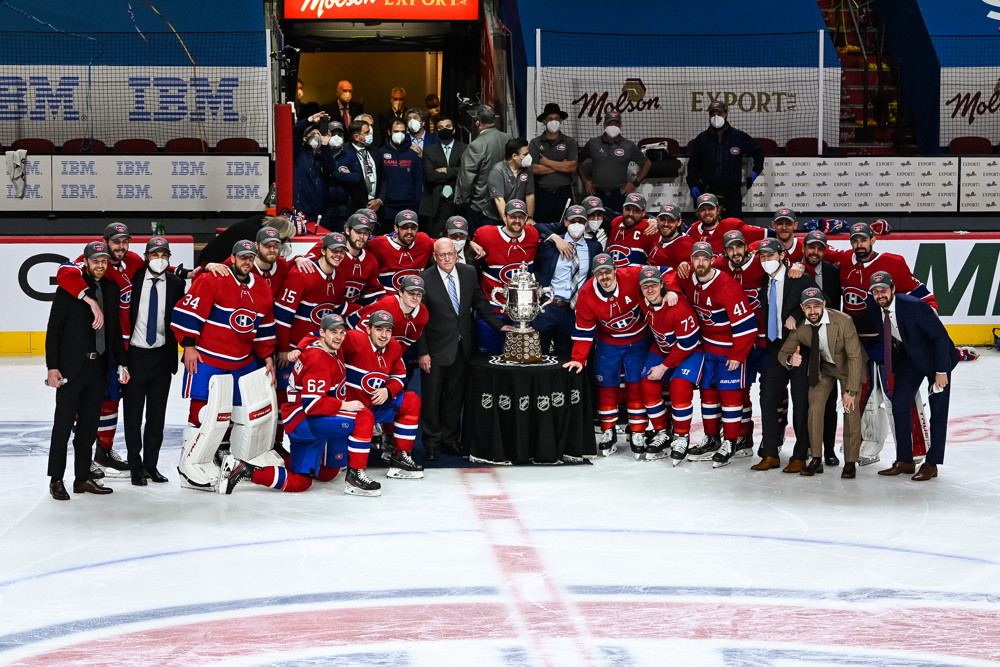Canadiens Counterpunch Their Way to the Stanley Cup Final
The Vegas Golden Knights saved their best for last. In Game 6 of their third-round matchup against the Montreal Canadiens, they controlled the lion’s share of the play and owned a series-best 68.3% of the expected goals at 5-on-5. It was easily the team’s strongest performance in Round 3…and it still wasn’t good enough to topple the Habs.
Despite facing a tidal wave of pressure, Montreal kept its composure, waited for its moment and pounced in overtime to eliminate the highly favored Golden Knights.
This is just the latest in a string of upsets by a stingy and opportunistic club. Over the six-game series, Montreal claimed 44.8% of the shot attempts, 44.4% of the scoring chances and 48.8% of the expected goals. However, the Habs were able to protect their slot and swiftly turn defensive stands into offensive strikes. That recipe for dominating the high-danger areas resulted in Montreal enjoying 55.9% of the grade-A opportunities.
It’s not exactly surprising, then, that the Habs won the series as well.
With that said, Game 6 wasn’t their finest effort. Their collective drive and intensity weren’t up to the standards they had set earlier in the postseason, and Vegas was able to post a 63.6 HDCF% with their backs against the wall. It launched pucks at Carey Price from all angles and generated some decent chances throughout the evening. More importantly, the Golden Knights didn’t unravel when they encountered their first hurdle. On an early Canadiens power play, Shea Weber conjured his 2010 self by lasering a slap shot through Robin Lehner:
In previous outings, Vegas would have folded right then and there. Case in point, after Marc-Andre Fleury squandered a lead late in Game 3, the Golden Knights entered a daze they couldn’t escape. They were already dead men walking by the time Josh Anderson put them out of their misery in overtime:
On Thursday night, Peter DeBoer’s men took every setback in stride. They stormed Montreal’s zone and applied a stronger forecheck than they had all series long.
Unfortunately for them, the Habs remained just stout enough at the point of attack to prevent the Golden Knights from running away with a lead. Vegas swarmed around the puck and tossed plenty of rubber in Price’s direction, but Montreal was prepared to hold the last line of defense. On several occasions, that meant acts of sheer desperation:
The majority of the time, though, it boiled down to containment. Every opportunity was more of a semi-chance—a contested look, a shot from distance or a forced backhand:
And when the Habs did slip up, either the Golden Knights revealed their subpar finish:
Or Price stood tall:
But let’s not fuel the belief that Montreal’s star netminder stole the series. Although Price was solid, no goaltender in the third round was blessed with a greater average shot distance. No goaltender faced fewer high-danger attempts per 60 minutes. No one came close. In other words, the Habs didn’t give up anything for free. You always had to navigate through sticks and bodies, conjuring extended waves of attack if you hoped to convert in the end.
In contrast, Montreal accomplished what Vegas could not over and over again: It got behind enemy lines. The Canadiens don’t possess world-beaters up front, so they bet big on the rush—and it paid off. Any time the Canadiens survived on defense, they immediately pushed for offense against a team that had emptied the tank. As such, quality opportunities came much easier to them than to their opponents.
Consider Cole Caufield’s second-period goal. Stretch pass, speed down the wing, top cheddar:
Now look at how hard Vegas has to work to tie the game up:
They have to chain together won puck battles, good decision-making, accurate passes and then ultimately rely on a poor rebound by Price. All those stars don’t align that often.
Meanwhile, there were multiple signs throughout the game that Vegas was ripe for the picking:
This is the sort of hockey purists can appreciate. It’s not about big names or highlight reels. It’s about devising the right strategy to come out on top. After Vegas took Game 1 in comfortable fashion, Montreal adjusted so effectively that the Golden Knights could never regain their footing. The Habs made sure to muddy every pass, every shot and every shift. And any time you slipped up, they were in position to land a haymaker. Contending with that for an entire series will shake anyone’s confidence.
It certainly flustered Vegas’ top forwards. Captain Mark Stone, Jonathan Marchessault and former Habs sniper Max Pacioretty combined for one goal and four points in the series. The power play was a complete flop (0-15). Over six games, the Golden Knights forwards tallied just five times. Their blue line produced eight goals. But if you’re relying primarily on your defense for offense, your back end is vulnerable to counterattacks.
Sure enough, that’s precisely how Arturri Lehkonen clinched the Habs’ berth to the Stanley Cup Final:
Frankly, this seemed like a great matchup for Vegas. It’s deep, experienced and boasts a vicious forecheck. Montreal could not have cared less. Its emphasis on tempo and newfound scoring ability consistently left the Golden Knights wondering what just hit them. They would dictate most of the action, let their guard down for a moment and then fish the puck out of their net.
Whether it’s the Lightning or the Islanders, the Habs’ next opponent will have to deal with clever tactics, stellar defense, veteran leadership, plucky enthusiasm and an unbreakable spirit. And the sum is somehow even greater than its parts.
Now that it’s found its groove, it’s going to take a lot to stop this train.
Recent Posts

How Corey Perry Is Making His Presence Felt With the Lightning
View Post »
How Adam Fox Pushed the Rangers Past the Penguins
View Post »

 PHI
PHI PIT
PIT TOR
TOR MTL
MTL TBL
TBL CHI
CHI EDM
EDM VAN
VAN COL
COL STL
STL BUF
BUF WSH
WSH NJD
NJD BOS
BOS NYR
NYR NYI
NYI DET
DET CAR
CAR NSH
NSH CBJ
CBJ WPJ
WPJ CGY
CGY ARI
ARI SJS
SJS VGK
VGK ANA
ANA LAK
LAK MIN
MIN OTT
OTT FLO
FLO DAL
DAL